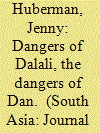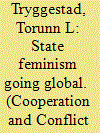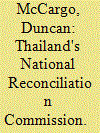| Srl | Item |
| 1 |
ID:
089539


|
|
|
|
|
| Publication |
2009.
|
| Summary/Abstract |
The thrust of the article is to investigate the reasons for the ambiguous character and results of the ENP. The argument is that these are a result of tensions inherent in the discourses produced at various sites in the EU that are involved in the development and implementation of the Policy. These tensions result in the simultaneous construction of mutually exclusive types of borders at the external edges of the EU. The main contribution of the present study to this argument is the detailed empirical evidence it provides for these tensions through the examination of the discourse of the European Commission. The article introduces the concept of soft/ hard borders as a very good analytical tool for studying the ENP and conducts a double-reading of the major types of Commission documents related to this Policy. The main finding is that at present some of the main hurdles the ENP is facing are a result of insufficient transformation of the assumptions and routinised practices that guide policy-making. These lead to underlying themes in Commission discourse that preclude the establishment of the necessary soft external border for the EU. Instead they promote the construction of more traditional hard borders.
|
|
|
|
|
|
|
|
|
|
|
|
|
|
|
|
| 2 |
ID:
100035


|
|
|
|
|
| Publication |
2010.
|
| Summary/Abstract |
The moral perils believed to be associated with the giving and receiving of dan (giving) have been widely noted by anthropologists of South Asia. However, among these studies of Indian giving and exchange, less attention has been devoted to exploring how and why commercial transactions become a site of moral condemnation. Drawing upon twenty months of fieldwork with the boys who operated as commission agents or dalals in the foreign tourist economy in the city of Banaras, I demonstrate how the youths regarded these earnings as morally problematic. I argue that the various condemnations of dalali (commission) were symptomatic of a set of deeper concerns regarding the impact of foreign tourism, the future of the boys and their families, and ultimately the (re)production of the socio-cultural order itself. Furthermore, I argue that narratives about the dangers of dalali took on significance because they intersected with more pervasive, highly ambivalent reactions to modernity in India. As such, the conceptions of the dangers of dalali and danprovided people with a concrete way to address social changes that seemed at once overwhelming yet inchoate.
|
|
|
|
|
|
|
|
|
|
|
|
|
|
|
|
| 3 |
ID:
193785


|
|
|
| 4 |
ID:
138766


|
|
|
|
|
| Summary/Abstract |
This article examines the role played by small states in the promotion or reinforcement of new ideas and emerging norms within international society. More specifically, it examines the role played by Norway in reinforcing the normative framework of ‘women, peace and security’, with a particular view to Norway’s first period of membership in the United Nations Peacebuilding Commission. Norway is regarded internationally as one of the lead countries in terms of promoting women’s rights in relation to peace and security. The article discusses four possible reasons that may explain Norway’s apparent suitability and effectiveness as a norm entrepreneur in this particular issue-area.
|
|
|
|
|
|
|
|
|
|
|
|
|
|
|
|
| 5 |
ID:
095810


|
|
|
|
|
| Publication |
2010.
|
| Summary/Abstract |
This article examines the work of the National Reconciliation Commission (NRC) (2005-06), an independent body established by the government of Thailand to address a violent conflict in the country's southern border provinces. From the outset, the 50-member NRC chaired by former Prime Minister Anand Panyarachun was too large and unwieldy to function effectively. At the most basic level, there was a lack of trust and openness among the Commission's members which curtailed frank discussions. Because the political dimensions of the conflict were seen as off-limits, for a variety of cultural and historical reasons, the NRC produced a report that emphasized issues of justice, but failed to engage with the core questions underpinning the violence. Locating the NRC within an emerging global landscape of comparable 'truth commissions', the article argues that however well-intentioned, the Thai commission lacked clear goals, and was rather disappointing in its achievements.
|
|
|
|
|
|
|
|
|
|
|
|
|
|
|
|
| 6 |
ID:
153293


|
|
|
|
|
| Summary/Abstract |
Members of the British Labour party have, not for the first time, criticised the Boundary Commissions’ proposals for new constituency boundaries as gerrymandering. This represents a misuse of the term: the Commissions have produced recommended constituencies in the context of new rules for such redistributions that give precedence to equality of electorates across all seats and the boundaries of those constituencies have been defined without any reference to the likely electoral consequences. The Conservatives, who were responsible for the change in the rules to emphasise electoral equality, wanted to remove a decades-long Labour advantage in the translation of votes into seats because of variations in constituency size, and the Commissions’ implementation of those rules has achieved that. A Labour advantage has been removed but not replaced by a Conservative advantage: in terms of electoral equality between the two, the playing field has been levelled. Labour's claim to have been disadvantaged by decisions on the electoral register is also examined; the disadvantage is probably only small.
|
|
|
|
|
|
|
|
|
|
|
|
|
|
|
|